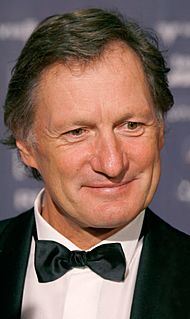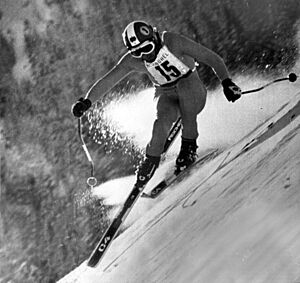Franz Klammer facts for kids
| Alpine skier | ||||||||||||||||||||||||||||||||||||||||||||||||

Klammer in 2009
|
||||||||||||||||||||||||||||||||||||||||||||||||
| Disciplines | Downhill, giant slalom, combined | |||||||||||||||||||||||||||||||||||||||||||||||
|---|---|---|---|---|---|---|---|---|---|---|---|---|---|---|---|---|---|---|---|---|---|---|---|---|---|---|---|---|---|---|---|---|---|---|---|---|---|---|---|---|---|---|---|---|---|---|---|---|
| Born | 3 December 1953 Mooswald, Carinthia, Austria |
|||||||||||||||||||||||||||||||||||||||||||||||
| Height | 1.83 m (6 ft 0 in) | |||||||||||||||||||||||||||||||||||||||||||||||
| World Cup debut | December 1972 (age 19) | |||||||||||||||||||||||||||||||||||||||||||||||
| Retired | March 1985 (age 31) | |||||||||||||||||||||||||||||||||||||||||||||||
| Olympics | ||||||||||||||||||||||||||||||||||||||||||||||||
| Teams | 2 – (1976, 1984) | |||||||||||||||||||||||||||||||||||||||||||||||
| Medals | 1 (1 gold) | |||||||||||||||||||||||||||||||||||||||||||||||
| World Championships | ||||||||||||||||||||||||||||||||||||||||||||||||
| Teams | 5 – (1974–85) includes 1976 Olympics |
|||||||||||||||||||||||||||||||||||||||||||||||
| Medals | 3 (2 gold) | |||||||||||||||||||||||||||||||||||||||||||||||
| World Cup | ||||||||||||||||||||||||||||||||||||||||||||||||
| Seasons | 13 – (1973–85) | |||||||||||||||||||||||||||||||||||||||||||||||
| Wins | 26 – (25 DH, 1 K) | |||||||||||||||||||||||||||||||||||||||||||||||
| Podiums | 45 – (41 DH, 1 GS, 3 K) | |||||||||||||||||||||||||||||||||||||||||||||||
| Overall titles | 0 – (3rd in 1975, 1977) | |||||||||||||||||||||||||||||||||||||||||||||||
| Discipline titles | 5 – (5 DH: 1975–78, 1983) | |||||||||||||||||||||||||||||||||||||||||||||||
|
Medal record
|
||||||||||||||||||||||||||||||||||||||||||||||||
Franz Klammer (born 3 December 1953) is a famous former alpine ski racer from Austria. He was known for being super fast in the downhill event. He won the World Cup downhill title four times in a row from 1975 to 1978. He also won a gold medal at the 1976 Winter Olympics in Innsbruck, Austria. Franz Klammer won 25 World Cup downhill races, including four times at the famous Kitzbühel race.
Contents
Early Life and Skiing Start
Franz Klammer grew up on a farm in Mooswald, Carinthia, Austria. Like many kids in the mountains, he skied to school every winter day. His village didn't have ski lifts, so he would climb up the hills behind his house to ski back down.
He started racing when he was 14 years old, which was a bit later than some other skiers. He worked on his family's farm in the summer and raced in the winter. It was tough for him to join the Austrian ski team because most skiers came from other parts of Austria.
Franz first raced in the World Cup in December 1972 when he was 19. He finished 32nd in his first race because he was very nervous. He spent 13 seasons racing in the World Cup, from 1972 to 1985.
Franz married his wife, Eva, in 1979. They met in 1975 when he was training in Tunisia. They have two daughters, Sophie and Stephanie.
Racing Career Highlights
Franz Klammer started showing how good he was in 1973. He finished second in a downhill race in St. Anton, right behind Bernhard Russi, who was an Olympic champion. He also got third place in a giant slalom race, which was the only time he finished on the podium in that event.
In the 1974 season, he finished second overall in the downhill standings. He beat famous skiers like Roland Collombin and Bernhard Russi in a tough race in Schladming.
Dominating the Downhill
The 1975 season was amazing for Franz. He won almost every downhill race that year! He even beat Bernhard Russi in a test race for the Olympics in Innsbruck.
At the 1976 Winter Olympics in Innsbruck, Franz was the favorite to win the downhill gold medal. He was 22 years old and had won many races leading up to the Olympics. He was the last of the top skiers to start. Bernhard Russi had set a very fast time, so Franz knew he had to take big risks. He skied incredibly fast, right on the edge of losing control, and won the gold medal by a small amount of time. The Austrian fans were thrilled!
Even though he was the best in downhill, Franz never won the overall World Cup title. This was because downhill was only one event, while other skiers could earn points in two technical events (slalom and giant slalom). The Super-G race, another speed event, didn't become a World Cup event until later in his career.
Franz Klammer won the World Cup downhill title five times: in 1975, 1976, 1977, 1978, and 1983. This is more than any other downhill skier. He won three times in a row (1975-1977) on the famous Streif course at Kitzbühel, and a fourth time in 1984.
Comeback and Later Years
After winning his fourth downhill title in 1978, Franz had a tough few years. He didn't win as much, possibly because his brother had a serious injury in a downhill race, and he also changed his ski brand.
He wasn't chosen for the Austrian team for the 1980 Olympics, so he couldn't defend his gold medal. But Franz didn't give up! He worked very hard to get back to his best. In 1981, after changing skis again, he won a race in Val-d'Isère. The next season, he won his fifth World Cup Downhill title. In 1984, he won at Kitzbühel again, which was very special to him because he hadn't won there in seven years.
Franz Klammer retired from racing in March 1985, when he was 31 years old. He finished his career with 26 World Cup victories. Many people consider him one of the greatest downhill racers ever.
Life After Skiing
After retiring from ski racing, Franz Klammer started racing cars! He drove Mercedes-Benz cars in races all over Europe and even in Australia. In 1990, he won a race in the European Touring Car Championship.
Franz Klammer is a hero to ski fans and helped make alpine ski racing more popular around the world. He is often called "The Kaiser" or the "Klammer Express."
He is known for being one of the first downhill skiers to "carve" a whole turn from start to finish. This means he used the edges of his skis to make smooth, fast turns, instead of sliding sideways.
Franz Klammer was inspired by his younger brother, Klaus, who became paralyzed after a ski crash. Because of this, Franz started the Franz Klammer Foundation, which helps athletes who have been seriously injured.
World Cup Achievements
Franz Klammer won the World Cup Downhill title five times.
| Season | Discipline |
|---|---|
| 1975 | Downhill |
| 1976 | Downhill |
| 1977 | Downhill |
| 1978 | Downhill |
| 1983 | Downhill |
Olympic Results
Franz Klammer competed in two Winter Olympics.
| Year | Age | Downhill |
|---|---|---|
| 1976 | 22 | 1 |
| 1980 | 26 | —^ |
| 1984 | 30 | 10 |
^ Franz Klammer was an alternate for the 1980 team and did not race.
Images for kids
See also
 In Spanish: Franz Klammer para niños
In Spanish: Franz Klammer para niños



